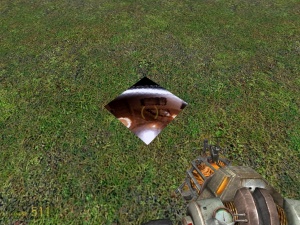Infodecal: Difference between revisions
Jump to navigation
Jump to search
 Note:Naming this entity will make it count towards the Entity limit and make it more expensive, similar to a light entity.
Note:Naming this entity will make it count towards the Entity limit and make it more expensive, similar to a light entity.
(Targetname stuff is already covered on Decals) |
(Note on naming) |
||
| Line 7: | Line 7: | ||
It is the entity created when the [[Hammer Decal Tool|Decal tool]] is used. It places a texture on any surface, with transparency if the texture being applied supports transparency. In Half-Life 1, these textures were indicated with a <nowiki>{</nowiki>, in Half-Life 2 they are placed in the decals/ texture folder. When needed, an [[info overlay | overlay]] can be used for more control over the applied texture. For example, an infodecal cannot be applied to a displacement, resized or rotated, while an overlay can. | It is the entity created when the [[Hammer Decal Tool|Decal tool]] is used. It places a texture on any surface, with transparency if the texture being applied supports transparency. In Half-Life 1, these textures were indicated with a <nowiki>{</nowiki>, in Half-Life 2 they are placed in the decals/ texture folder. When needed, an [[info overlay | overlay]] can be used for more control over the applied texture. For example, an infodecal cannot be applied to a displacement, resized or rotated, while an overlay can. | ||
{{note|Naming this entity will make it count towards the [[Entity limit]] and make it more expensive, similar to a [[light]] entity.}} | |||
== Keyvalues == | == Keyvalues == | ||
{{KV|texture|decal|The image to apply as a decal.}} | {{KV|texture|decal|The image to apply as a decal.}} | ||
Revision as of 13:30, 29 January 2018
Template:Base point It is used to place a decal in a map.
Entity description
It is the entity created when the Decal tool is used. It places a texture on any surface, with transparency if the texture being applied supports transparency. In Half-Life 1, these textures were indicated with a {, in Half-Life 2 they are placed in the decals/ texture folder. When needed, an overlay can be used for more control over the applied texture. For example, an infodecal cannot be applied to a displacement, resized or rotated, while an overlay can.
Keyvalues
- Low Priority (can be replaced) ([todo internal name (i)]) <boolean>
- If true, allows the decal to be removed to accommodate newly-placed decals. Default behavior is false (high priority), meaning it is always present.
- Name (targetname) <string>[ Edit ]
- The name that other entities refer to this entity by, via Inputs/Outputs or other keyvalues (e.g.
parentnameortarget).
Also displayed in Hammer's 2D views and Entity Report.See also: Generic Keyvalues, Inputs and Outputs available to all entities
Inputs
- Activate
- Force the decal to apply itself to the world.
